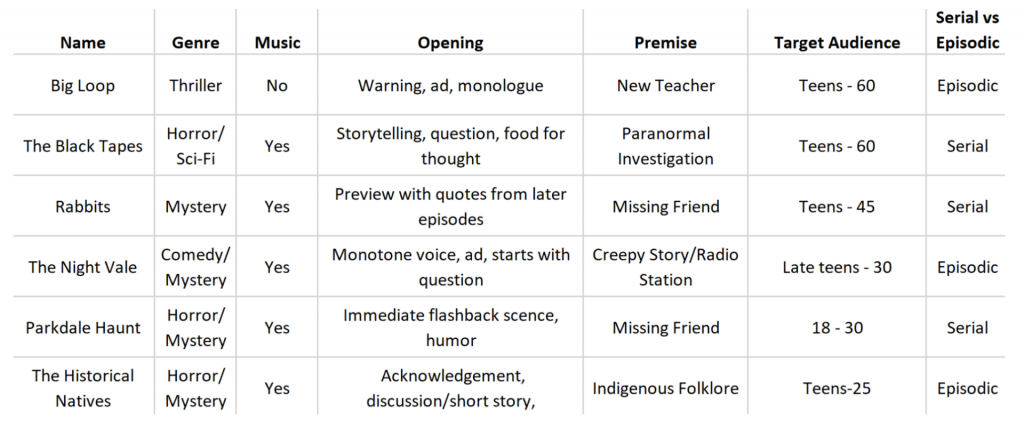In my introductory blog post, I outlined four overlapping phases for my In-Depth project. This month, I have been mainly focusing on phase one, researching podcasts. I listened to the opening minutes of a number of different podcasts and highlighted some key aspects below.
From listening to the different podcasts, I observed the following.
- Mainly science fiction/horror genres
- Evenly split between serial and episodic
- Most were 20-25 minutes
- Two focused on missing friends
- Most used first person point of view
- Only one used humour as a literary device
Based on my research, I have also identified the following qualities that I need to decide on for my own podcast. Some of these qualities are:
- Serial/Episodic
- Genre
- Theme/Message
- Premise
- Perspective/Point of view
- Setting
- Backstory
- Characters
- Time period
In order to map out my ideas, I set up a vision board using different coloured post-it notes, and printed images. After some thought, I decided on a mystery/horror/thriller genre. I started developing a premise with outlines of characters and settings. With these preliminary ideas in mind, I contacted my mentor, Mr. Gosselin for more guidance.
During my meeting with Mr. Gosselin, we discussed a number of the issues listed above. I tried to practice how to genuinely agree by setting aside my own ego and actively listening to Mr. Gosselin’s advice. First, we began discussing the advantages and disadvantages of having a serial vs. episodic format for my podcast. Although I entered the conversation with my own opinion, I did my best to look at both sides. Since Mr. Gosselin has extensive experience in scriptwriting, I felt that he has “special experience” (de Bono, 8). That being said, Mr. Gosselin does not have specific podcasting experience and so I thought discussing the pros and cons would be more worthwhile than just asking him to recommend or choose one. On this topic, my mentor and I reached a point of agreement that having a serial format would be the best approach. By having a serial podcast, I could develop one specific set of characters, and would not have to find new voice actors for each episode.
The length of the podcasts was another issue that we discussed. I wanted 20-30 minute podcasts. However, Mr. Gosselin provided advice based on previous experiences with screenwriting. Mr. Gosselin pointed out that a 20 minute script would be over 20 pages long. He voiced his concern that a 20-30 minute podcast with 5 or more episodes would be a lot to handle in my amount of time. Overall, I found following de Bono’s advice on “how to disagree” challenging because I do not have personal experience within this topic. Furthermore, as I am just starting to research and understand the writing portion of my In-Depth project, I do not have much insight yet. However, this discussion ended with a compromise where we agreed to start off slower and work our way up based on past performances. I accepted the difference in our opinions as I recognized that I cannot really estimate the optimal podcast length prior to actually writing it.
I will continue to work on planning the structure of my podcast as well as researching more of the technical components. Mr. Gosselin suggested scheduling our next meeting after I have laid out more of my story.


Leave a Reply